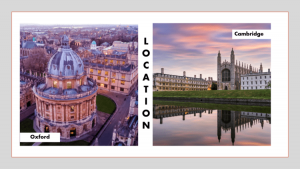It requires a little more effort when it comes to differentiating two of the most famous and prestigious universities, with an excellent reputation globally. Many parameters can be used to distinguish Oxford vs. Cambridge MBA program, such as your career goals, the cost of living, admissions requirements, return on investment, cost of attendance, and scholarships.
The first step towards deciding which business school is better for you is to compare the admissions requirements.
Are you even eligible to apply to these business schools? If yes, then in which business school you have a higher probability of getting accepted? Which business school will provide you with a better return on investment and is cost-efficient for you?
To answer these questions, we differentiate between Oxford vs. Cambridge based on few parameters and help you decide which school is better for an MBA – Oxford or Cambridge.

Here are the parameters to analyze Oxford vs. Cambridge:
- Admissions process
- Location and cost of living
- Class Profile
- Career opportunities
- Cost of Attendance and Scholarship Programs
- Alumni network
- Key TakeAways
Oxford vs. Cambridge MBA: Admissions process
Key differences between Oxford vs. Cambridge MBA Admissions requirements:
|
Oxford vs. Cambridge |
||
| MBA Admissions Requirements | Oxford |
Cambridge |
| Undergraduate Degree | Undergraduate Degree or Equivalent | Undergraduate Degree or Equivalent, at least 2:1 (Preferably candidates in the top 25% of their undergraduate class) |
| Exam score | GMAT or GRE Score | GMAT or GRE Score |
| Work Experience | Two years of Work experience | Three years of work experience |
| References | Two professional or academic letters of reference | One professional reference |
| Essay questions and Online Assessment | One supporting statement with optional Essay, Online assessment (4 video responses and one written responses) | One personal statement and two essay questions written |
| English language skill | IELTS: 7.5
TOEFL: 110 |
IELTS: 7.5
TOEFL: 110 |
- Both schools are similar when it comes to admission requirements. They require an excellent undergraduate degree, but Cambridge mentions that they prefer candidates to be in the top 25% of their undergraduate graduating class.
- Both schools accept the GMAT and GRE scores, but neither reports the GRE score average.
Confused between whether to give GMAT or GRE? Read here
- Cambridge requires three years of pre-MBA experience, whereas Oxford states a minimum of two years’ experience before the MBA.
- Oxford requires two professional or academic letters of reference, whereas Cambridge requires one professional reference.
- When it comes to Essays writing and online assessments for MBA admissions, Oxford has one supporting statement with an optional essay. There is also an Online assessment where candidates should submit four video responses and one written response. For Cambridge MBA Admissions, you require one personal statement and two written essay questions.
Here are few tips for the Oxford MBA essay.
- Both schools have a 7.5 IELTS or 110 TOEFL requirement and an application fee of approx. – £150.
From the above observations, we can say that Cambridge has a more stringent admissions process as compared to Oxford. It prefers candidates who are in the top 25% of their undergraduate class and requires more years of work experience than Oxford. Oxford, on the other hand, makes up for it by having an additional online assessment.
Oxford vs. Cambridge MBA: Location and Cost of Living
Both Oxford and Cambridge are close to the UK’s capital and are easily accessible, with both located about an hour from Central London by train.

Oxford is technically a city and Cambridge, a town. Still, both are relatively small and compact places to live and can be easily explored on foot or by cycling (a prevalent activity). Both have stunning historic architecture, rivers running through the city centers, and hordes of tourists.
If we compare Oxford vs. Cambridge based on the location, there are a lot of similarities but, Oxford is livelier, busier, and often clogged with traffic. Some of the most popular attractions at Oxford are the Oxford Castle, the oldest botanical gardens in England, the world-famous Bodleian Library and Blackwell’s Bookshop, historic pubs, and many more.
Cambridge is much more peaceful, with plenty of green space and beautiful historic architecture. Students can enjoy the setting as an inspiring backdrop for study and collaboration. It is a town dominated by its university. Cambridge Judge Business School sits right in the middle of the city, surrounded by colleges. The city of Cambridge is also referred to as the ‘Silicon Fen’ because of the high density of technology innovation and start-up activity.
Thus, if you are looking for a hustle-and-bustle opt for Oxford MBA, whereas if you are looking for a peaceful environment, go for Cambridge MBA.
Cost of Living at Oxford and Cambridge
Cambridge has a lower cost of living than Oxford. You would need around £3,606 in Cambridge to maintain the same standard of life that you can have with £3,700 in Oxford. However, if you are planning to go out with friends to restaurants, Cambridge restaurant prices are 17.90% higher than in Oxford.
If you are renting an apartment, then Oxford rent prices are 6.29% higher than in Cambridge. Similarly, the purchasing power at Oxford is 0.84% higher than Cambridge.
Here is the table comparing the cost of living for Oxford vs. Cambridge:
| Cost of living | Percentage Higher/ Lower | Oxford | Cambridge |
| Consumer Prices | 0.45% | Higher | Lower |
| Consumer prices including rent | 2.54% | Higher | Lower |
| Rent Prices | 6.29% | Higher | Lower |
| Restaurant Prices | 17.90% | Lower | Higher |
| Groceries Prices | 8.32% | Higher | Lower |
| Local Purchasing power | 0.84% | Higher | Lower |
Thus, the cost of living in Cambridge is less expensive than in Oxford.
Oxford vs. Cambridge MBA: Class Profile Full-Time MBA 2018 – 2019
Now that we have compared location for both business schools, let’s look at the class profile for Oxford vs. Cambridge:
| Oxford vs. Cambridge | Oxford | Cambridge |
| Class Size | 329 | 202 |
| Female | 44% | 35% |
| Average GMAT Score | 690 | 691 |
| Average Age | 29 | 30 |
| Average Work Experience | Five years | Six years |
| Nationalities | 64 | 41 |
| International students | 95% | N/A |
Both schools have a similar applicant pool. Oxford Business school has a class size of 329, whereas Cambridge Judge Business School has a relatively smaller class of 202 for its full-time MBA program. Thus, students at Oxford have opportunities to build more extensive networks with more diverse classes, with 64 nationalities represented, whereas Cambridge students enjoy more intimate class sizes, with students representing 41 nationalities.
There is not much difference when it comes to the average GMAT score. For Oxford and Cambridge, it is 690 and 691, respectively.
Thus, Oxford enrolls more students each year than Cambridge. However, Oxford does not receive more applications. For the Class of 2019, Cambridge received 1,286 applications, and Oxford received 1,586 applications. If we compare Oxford vs. Cambridge on a ratio of application to the number of students admitted, Cambridge has a lower acceptance rate than Oxford.
Thus, with a lower acceptance rate than Oxford, to get an admit in Cambridge is more difficult than Oxford.
Learn what is a good GMAT score required to get into Oxford or Cambridge.
Oxford vs. Cambridge MBA: Career opportunities

The table provides career opportunities for Oxford vs. Cambridge:
|
Oxford vs. Cambridge Placement Statistics |
||
| Oxford vs. Cambridge | Oxford 2018 |
Cambridge 2018 |
| Job Offers within three months of graduation | 92% | 93% |
| Average Base Salary | £72,618 | £95,779 |
|
Employment by Major Industry |
||
| Agriculture | NA | 1.02% |
| Art/Entertainment/Media | 1% | 1.02% |
| Technology | 24% | 20.91% |
| Consulting | 23% | 22% |
| Financial Services | 27% | 17% |
| Social Impact | 10% | NA |
| Consumer packaged goods | 6% | 2.04% |
| Energy | 4% | 2.04% |
| Manufacturing | 2% | NA |
| Retail | 1% | 1.02% |
| Industrial | 1% | NA |
| Healthcare | 1% | 3.57% |
| Other | 1% | 2.02% |
| Electronics | NA | 2.04% |
| Internet/eCommerce | NA | 15.3% |
| Mining/Raw Material | NA | 1.02% |
| Public Sector/NGO | NA | 9% |
Note: Data from Oxford and Cambridge Employment report 2018 and 2018. Employment data 2019 for both schools are yet to be published.
Oxford vs. Cambridge MBA: Comparing based on Career Goals
From the above table, the key differences while comparing Oxford vs. Cambridge based on Career Goals are:
- For candidates who want to pursue Finance, Consulting, and Technology, Oxford MBA is a better choice as most of its 2018 class got placed into these industries
- Candidates who want to get into the Internet/E-commerce sector can choose the Cambridge MBA. For its 2018 MBA class, 15.3% of graduates got placed in the e-commerce industry
- For Consumer goods, Energy, manufacturing and social impact sector, Oxford is better
- For Electronics, Public sector/NGOs, and Healthcare, Cambridge is better
Career Opportunities at Oxford and Cambridge
When we compare Oxford vs. Cambridge career opportunities, both schools have reported strong career outcomes in recent years. 92% of the Oxford MBA class and 93% of the Cambridge MBA class got job offers within three months of graduation.
The Career services offered at Oxford has a Talent management program, where a series of workshops and events are organized for MBA students who are looking for personal and professional skill development. Leading global experts deliver seminars on presentation skills, business writing skills, personal brand development, and salary negotiations. Apart from this, there is a dedicated careers team of advisors working with students and coaching them for interviews.
The MBA careers team at Cambridge provides a full program of coaching and guidance. They have the partnership model where MBAs receive one-to-one coaching throughout the year from members of the dedicated MBA Careers Team based at the school as well as external career consultants with industry specialization. The Career Development program helps in defining career goals, job search, developing skills, drafting job applications, and developing interview skills.
The average base salary of an Oxford MBA graduate is £72,618 as compared to $95,779 for Cambridge. The majority of graduates from both the schools got jobs in the consulting industry, with 23% from Oxford and 22% from Cambridge. The technology industry is the second-largest sector where most of the graduates from both the schools are employed, Oxford at 24% and Cambridge at 20.91%.
The consulting industry offered an average salary of £77,030 at Oxford, whereas, at Cambridge, it is £73,414. The highest salary in Consulting at Oxford is £140,641, whereas at Cambridge it is £110,418.
Similarly, the Finance industry provided an average salary of £64,313 for Cambridge graduates and £74,154 for Oxford graduates. The highest salary in Finance at Oxford is £142,184, whereas at Cambridge it is £110,418.
Thus, when it comes to Return on Investment (ROI), Oxford is better than Cambridge.
Read the individual report on Oxford and Cambridge Class Profile, Admissions, Placement Report, and Notable Alumni.
Hiring Companies
Some of the significant hiring companies for Oxford class of 2018 are:
- Consulting: BCG, EY, Strategy, Accenture, Deloitte, McKinsey & Company, and KPMG
- Finance: American Express, Goldman Sachs, Jp Morgan, Yes Bank Ltd, IMC, HSBC, and IDB Invest
- Global Industry: Amazon, Facebook, Google, Kraft-Heinz, British American tobacco, and Diageo
For Cambridge, some of the significant recruiters are Amgen, Bookee, Bain & Company, American Express, Barclays Bank, Citi, Facebook, HSBC, KPMG, JP Morgan, and Kraft Heinz.
Did you know that your GMAT score holds 16% of weightage when it comes to MBA Application? Kick start your GMAT Preparation with our Free Trial and get access to quality online content and free GMAT resources.
Oxford vs. Cambridge MBA: Cost of Attendance and Scholarship Programs
The Cost of an MBA at Oxford University is approx. £59,490 for 2020-21, which includes course fees and a life-long Oxford Union Membership. Cambridge University MBA cost for 2021/21 is approx. £57,000, which consists of the course fee.

Apart from the course fee, there are other costs also involved, such as accommodation and living expenses during your MBA.
To help you finance your MBA, both schools offer a range of scholarships. Although the type of scholarship offered is different when we compare Oxford vs. Cambridge.
Here are key differences relating to MBA scholarships at Oxford and Cambridge:
|
MBA Scholarships |
Oxford |
Cambridge |
| Criteria | Academic excellence, leadership qualities, Geography, and Merit | Six categories – Academic achievement, women, nationality, LGBTQ, CJBS, and sector of work experience |
| Number of Scholarships | 23 | 15 |
| When it is offered | Some awards have a fixed deadline and might require additional application | Every MBA Admissions Round (No funds are awarded after the school has started)
At the time of the interview, it gets awarded |
| Range | £8,000 – £60,000. | £10,000 – £25,000. |
| For students not eligible for Scholarship | Can opt for Bursaries | Can opt for Bursaries offered on merit |
Cambridge MBA provides scholarships based on six different categories – Academic achievement, Sector of work experience, women, Nationality, LGBTQ community, CJBS Bursaries. Only candidates shortlisted for an interview will be able to apply for a scholarship based on eligibility.
The scholarship at Cambridge is offered in every round, and no funds can be awarded after the school year has started. In total, there are 15 kinds of scholarships provided for Cambridge MBA students.
Cambridge MBA Scholarship can range from £10,000 – £25,000. Also, for students who are not eligible for any scholarship can opt for Bursaries, which is offered based on merit. At the time of the interview, it gets awarded.
Oxford MBA offers a wide variety of scholarships as compared to Cambridge. Some of the awards have fixed application deadlines, and some require an additional application. Not all candidates will meet the eligibility criteria for Oxford Scholarship, and thus, the school offers bursaries.
The criteria for awarding scholarship at Oxford include academic excellence, leadership qualities, geography, and merit. In total, there are 23 kinds of scholarships offered by Oxford and can range from £8,000 – £60,000.
Apart from scholarships, various Loans are offered to candidates holding a conditional offer for Oxford and Cambridge.
Thus, the number of MBA scholarships awarded at Cambridge is lesser than Oxford, but it is more structured. Cambridge has six categories in which they offer scholarships. Also, the minimum scholarship amount at Oxford (£8,000) is lesser than Cambridge (£10,000). However, Oxford provides more types of scholarships as compared to Cambridge.
At last, we would suggest having a look at the scholarships offered by both schools and if you are eligible for it. Based on that, you can choose between Oxford or Cambridge MBA scholarship.
Did you know a high GMAT score can increase your chances of getting a scholarship? In Fact, a high GMAT score is an eligibility criterion for a few of the scholarships offered by both the schools. Learn about what is a good GMAT Score to get an MBA scholarship.
Oxford vs. Cambridge MBA: Alumni network

Both schools offer an excellent alumni network. But the alumni network at Oxford is more extensive than Cambridge. The Oxford Business Alumni (OBA) network is the school’s official alumni community. It brings together individuals that share a common interest and are proud ambassadors around the globe. Oxford reports 18,000+ members, across 140+ countries, with 60+ dedicated ambassadors globally.
On the other hand, the Cambridge MBA program reports 9600+ members. Alumni host various activities at Cambridge, such as the guest speakers, hosting a student’s project, helping the current students with recruitment, and many more.
Oxford vs. Cambridge MBA: Key Takeaways
After analyzing Oxford vs. Cambridge based on career goals, admission process, eligibility, cost of attendance, scholarship, and placements, here are the key differences. We have classified it into a few scenarios based on the candidates’ profile:
- Scenario 1: You are a female international student between the age group of 25-35
Oxford MBA program accepts more percentage of female candidates and has more international students than Cambridge. Thus, it would be favorable for you to choose Oxford over Cambridge.
- Scenario 2: You have work experience between 2 – 6 years
Oxford MBA requires the candidate to have a minimum 2 years of work experience, whereas Cambridge required a minimum of 3 years. Thus, if you have less than three years of work experience, it’s better to opt for the Cambridge MBA program.
Also, Cambridge has a low acceptance rate than Oxford, thus getting an admit at Oxford will be a bit easier than Cambridge.
- Scenario 3: You have work experience between 2-6 years and looking for Scholarships
After taking the scenario 2 points into consideration, if you are looking for more options when it comes to MBA scholarships, opt for Cambridge as it has 23 options to choose from. Oxford has 15. Both the schools offer bursaries on merit-based if you are not eligible for scholarships.
It is advisable to go through all the options of scholarships available at the business school website.
- Scenario 4: You aspire to have a career in Consulting, Financial Services, and Technology industry
Oxford sends the majority of its MBA graduates to these three industries than Cambridge. Also, the average salary for these three industries is higher in Oxford than Cambridge.
Similarly, for Consumer goods, Energy, manufacturing and social impact sector, Oxford is better than Cambridge
- Scenario 5: You aspire to have a career in Internet/E-commerce sector
Cambridge (15.3%) sends the majority of its MBA graduates to the internet/e-commerce industry. Similarly, for Electronics, Public sector/NGOs, and Healthcare, Cambridge is better
Here are some related articles on Business school comparison:















